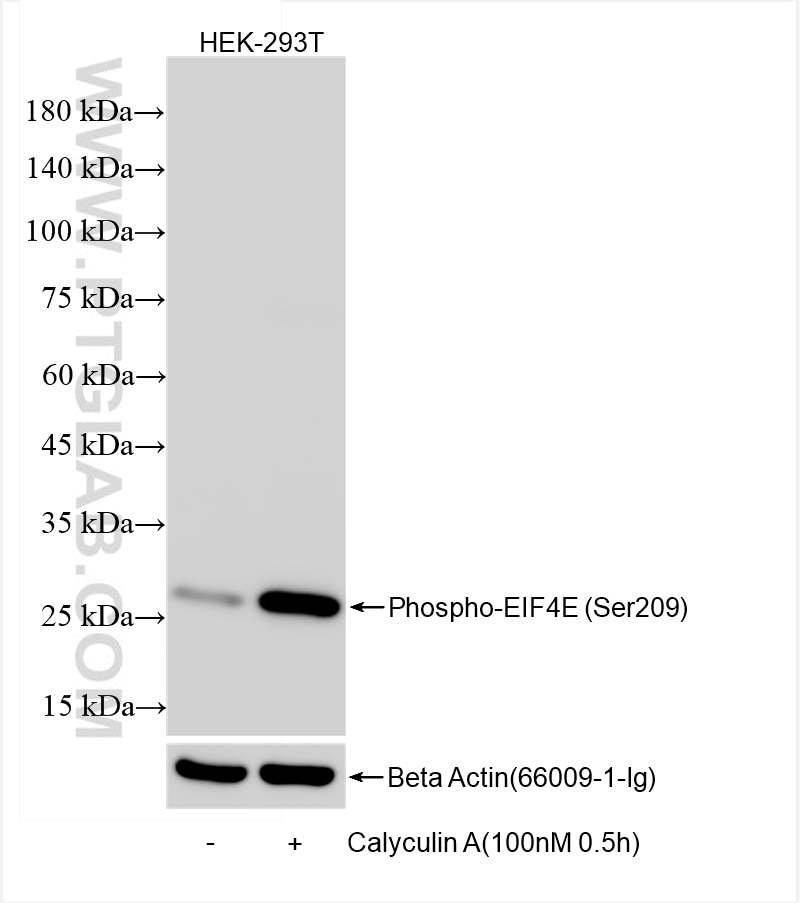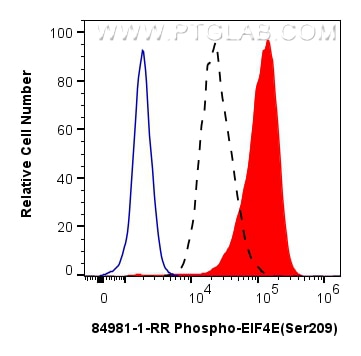Tested Applications
| Positive WB detected in | Calyculin A treated HEK-293T cells |
| Positive FC (Intra) detected in | Calyculin A treated HEK-293T cells |
Recommended dilution
| Application | Dilution |
|---|---|
| Western Blot (WB) | WB : 1:2000-1:10000 |
| Flow Cytometry (FC) (INTRA) | FC (INTRA) : 0.13 ug per 10^6 cells in a 100 µl suspension |
| It is recommended that this reagent should be titrated in each testing system to obtain optimal results. | |
| Sample-dependent, Check data in validation data gallery. | |
Product Information
84981-1-RR targets Phospho-EIF4E (Ser209) in WB, FC (Intra), ELISA applications and shows reactivity with human samples.
| Tested Reactivity | human |
| Host / Isotype | Rabbit / IgG |
| Class | Recombinant |
| Type | Antibody |
| Immunogen | Peptide Predict reactive species |
| Full Name | eukaryotic translation initiation factor 4E |
| Calculated Molecular Weight | 29 kDa |
| Observed Molecular Weight | 25 kDa |
| GenBank Accession Number | BC012611 |
| Gene Symbol | EIF4E |
| Gene ID (NCBI) | 1977 |
| Conjugate | Unconjugated |
| Form | Liquid |
| Purification Method | Protein A purfication |
| UNIPROT ID | P06730 |
| Storage Buffer | PBS with 0.02% sodium azide and 50% glycerol, pH 7.3. |
| Storage Conditions | Store at -20°C. Stable for one year after shipment. Aliquoting is unnecessary for -20oC storage. 20ul sizes contain 0.1% BSA. |
Background Information
Eukaryotic initiation factor 4F (eIF4F) is a critical effector and is thought to be the rate-limiting determinant of translation. The activity of eIF4E can be regulated by phosphorylation at Ser209, which is controlled by mitogen-activated protein kinase-interacting kinases Mnk1 and Mnk2. Although the function of eIF4E phosphorylation remains the subject of debate, it has been documented that the phosphorylation of eIF4E at Ser209 is crucial for biogenesis, tumorigenesis, and viral infection. (PMID: 38299843)
Protocols
| Product Specific Protocols | |
|---|---|
| WB protocol for Phospho-EIF4E (Ser209) antibody 84981-1-RR | Download protocol |
| Standard Protocols | |
|---|---|
| Click here to view our Standard Protocols |





